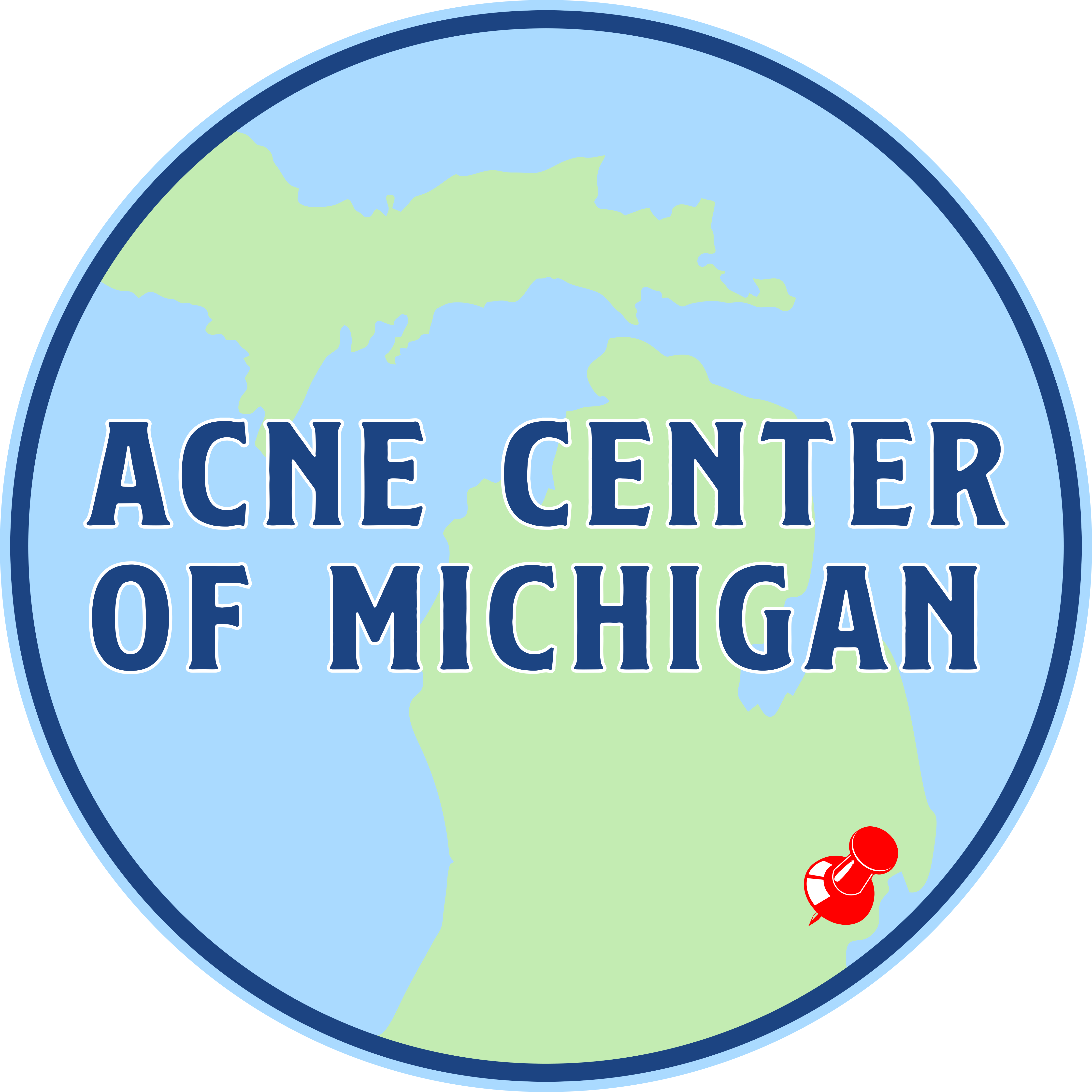Questions and answers
Why do I have acne? How can I make my acne better? We have the answers to all of your questions!
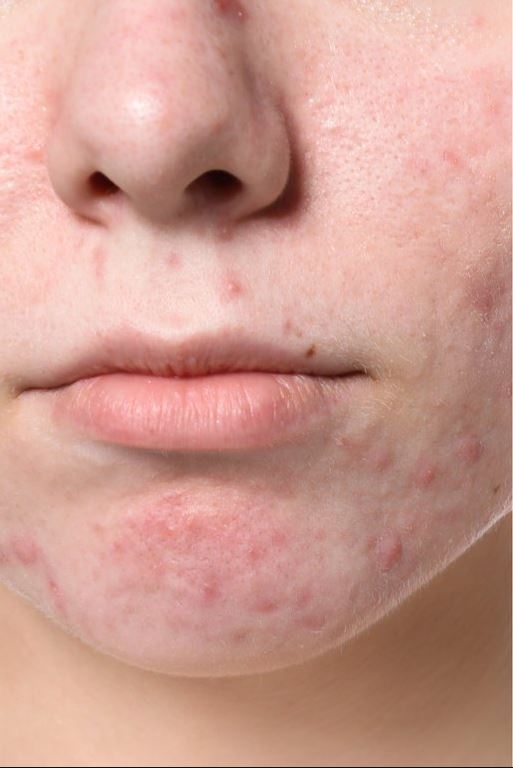

Q&A
Why do I have acne? What triggers acne?
Acne is caused by two main influences:
- Family History – Those with a strong family history of acne, and in particular scarring acne, seem to get more acne.
- Hormones – Hormones rise with the onset of puberty and acne is the first sign of adolescence. Furthermore, hormones fluctuate with menstrual cycles and are heavily influenced by stress. This explains why those who under more stress (e.g. upcoming examinations) tend to flare of acne.
- Additional Causes
- Those people who take anabolic steroids get more acne.
- Those with a hormone imbalance (e.g. PCOS) develop more acne.
- Certain birth control methods such as progestin only (e.g. Depo-Provera or Mirena IUD) can make acne worse.
- Acne can be triggered by mechanical occlusion such as hats, headbands, chin straps, occlusive clothing, as well as heavy makeup.
- Certain medications such as lithium can also trigger acne
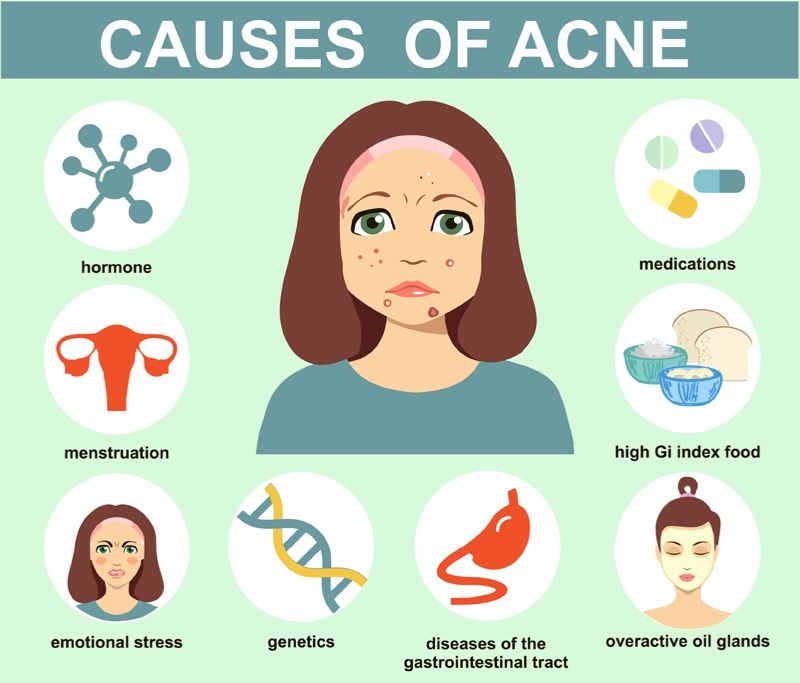
Are there different types of acne lesions?
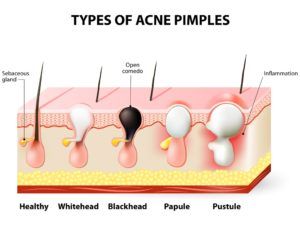
There are multiple different types of acne lesions. The earliest lesion is known as a comodone (more commonly referred to as “blackheads and whiteheads”). These are the basic form of acne in which oil and skin cells clog the pores. Papules and pustules (i.e., “zits”) represent the body’s inflammation towards the overgrowth of C. Acnes bacteria within the pores. Cysts and nodules refer to inflammation associated with ruptured pores and carry a higher risk of potential scarring. In general, it is easier to calm down the inflammatory lesions quicker than it is to unclog the pores. – It takes months to unclog the pores.
Can I scrub my pores open ?
No. It is impossible to scrub open your clogged pores. In fact, the more you scrub, the worse the acne may become. It is best to avoid cleansers with grapefruit pits, beads, and other harsh chemicals. It is frustrating that it takes months to unclog pores. The best way to accomplish this is through exfoliating cleansers, retinoids (i.e., Acne Duo Plus™, Retin-A™, adapalene, tazorotene etc.), and chemical peels. It is critical to remember that you must apply a non-comodogenic moisturizer to minimize irritation.
How often should I wash my face?
Wash your face every morning, every evening, and after exercise.
What facial cleanser should I use?
- Use a mild cleanser that won’t clog your pores. (The label may say “won’t clog pores” or “non-comedogenic”). Harsh scrubs with grapefruit pits and beads should be avoided.
- Do not use astringents, alcohol, or witch hazel.
- If you have very oily skin, then a cleanser with salicylic acid (i.e., Neutrogena oil free acne wash) may be useful. But keep in mind that that salicylic can dry out your skin and produce irritation. Using a facial moisturizer afterwards is a must, even if you have oily skin.
Examples of commonly recommended cleansers:
For Combination skin:
- Neutrogena transparent facial bar
- CSD glycolic acid wash
For Sensitive skin
- Neutrogena ultra-gentle hydrating cleanser (for sensitive skin)
- Dove sensitive skin bar (for sensitive skin)
- Cetaphil daily facial cleanser (for sensitive skin)
For Oily Skin:
- Salicylic acid wash (Neutrogena oil free acne wash)
What is glycolic acid wash? Does it help acne?
Glycolic acid is a gentle facial cleanser used for the treatment of acne. Alpha-hydroxy acids provide exfoliation, and their low pH helps reduce P. acnes levels on the skin. Glycolic acid is well-suited for use by individuals with dry skin because the hydroxy acids act as humectants (i.e., draw water into the skin). In addition, the exfoliating activity of glycolic acid improves the penetration of other acne medications into the skin. Glycolic acid wash is available for purchase at Craig Singer MD Dermatology.
What facial moisturizer should I use?
Several moisturizers are available for purchase over the counter. (The label may say “won’t clog pores” or “non-comedogenic”). Some people prefer one over another. Some people find that certain moisturizers sting or irritate their skin. It may take some trial and error to figure out what you like best. Dr. Singer’s personal preference is for a moisturizer called Theraplex Hydro lotion™ sold on Amazon. However, many other over-the-counter moisturizers are more than adequate. These include Neutrogena Hydro boost™, Cetaphil moisturizer™ and Cerave moisturizing cream™.
What do I apply first? -my medications or the moisturizer?
Apply your acne medications first and then apply the moisturizer second, on top of your acne medications. On rare occasion, if a topical retinoid medication is producing irritation, you may be instructed to apply the moisturizer before the topical retinoid.
I have oily skin. Do I need to moisturize?
It is always a good idea to apply a moisturizer to the skin after you wash your face. This preserves the normal skin barrier and minimizes irritation. The more irritated your skin becomes, the worse the acne becomes. Even if you have oily skin, it is still wise to moisturize. Gel based moisturizers are ideal for oily skin. An example would be Hydro boost™ by Neutrogena.
Why should I treat my acne?
Dermatologists know that letting acne runs its course is not always the best advice. Here’s why:
- Without treatment, dark spots and permanent scars can appear on the skin as acne clears.
- Treating acne often boosts a person’s self-esteem.
- Many effective treatments are available
What happens if I pick my acne?
When you pick acne lesions, you are creating an injury to your skin.- This leads to persistence of the acne lesion for weeks. Also, you will likely end up with temporary redness or a dark spot on your skin lasting even longer. And finally, a permanent mark (i.e. scar) may develop from picking.
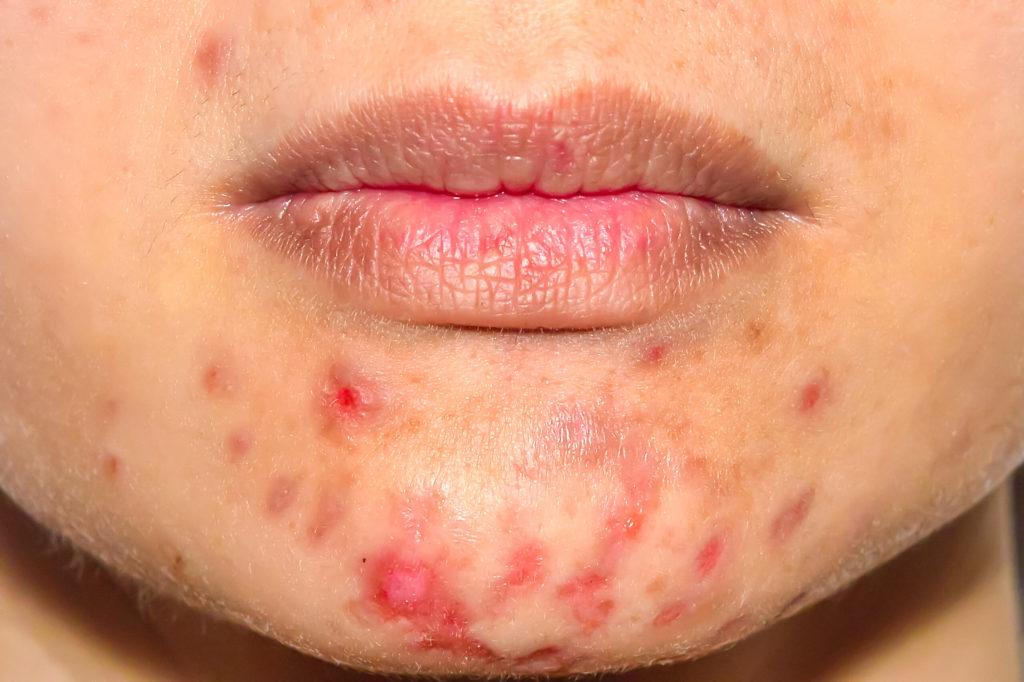
Our recommendation: When you develop a large acne cyst, it is best to perform a hot compress with a wet washcloth for five minutes and spot treat with a topical acne medication. Also, Dr. Singer can inject the acne cyst with cortisone which usually shrinks the lesion within 48 hours. We welcome patients on a walk-in basis for acne injections.
Can you make my acne cyst go away quickly?
Usually, we can. Dr. Singer can inject your acne cysts with cortisone which will typically make your larger cysts shrink over the next 48 hours.
Why do I have dark spots on my face? Is there treatment for dark spots?
Those people who have a darker skin complexion (i.e. skin of color) tend to develop dark spots in previous areas of acne. This is known as post inflammatory hyperpigmentation. When someone with a darker skin complexion sustained an injury to the skin, a bug bites or a pimple, the pigment cells in the skin are stimulated to release excessive amount of pigmentation. This leads to an uneven complexion and can be more bothersome than the acne itself.
The first step in addressing the discoloration is to aggressively treat the acne to prevent new pimples from forming. If the acne is not adequately controlled, then any treatment of dark spots will be ineffective.
Use of sunscreen is mandatory, bleaching creams (such as Triple therapy), and chemical peels are effective. Additional treatments include kojic acid, Tranexamic acid (e.g. Lytera), etc.
Dark Spots from Acne often require a “Triple Therapy” bleaching cream
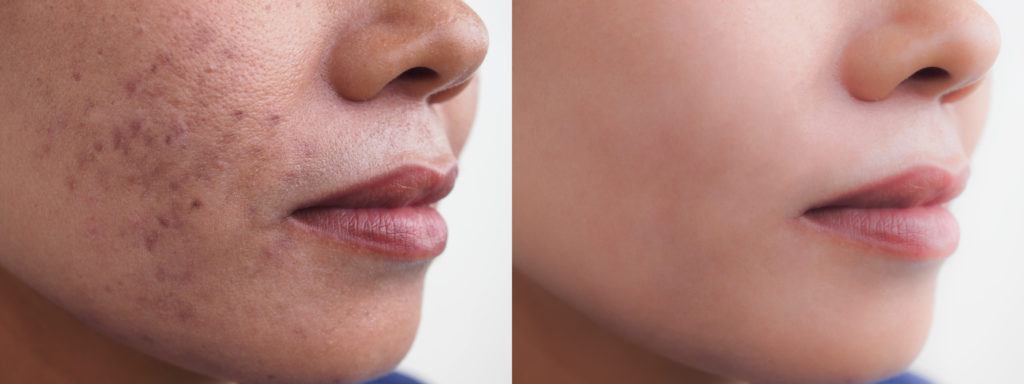
I am 40 years old. Why do I have acne?
It is estimated that 25% of women at the age of 40 years have acne, and even 10% of women at the age of 50 experience acne! This is known as an “adult female acne.” Most of the time, flares develop around the chin and jaw line in what’s known as a “hormonal distribution” of acne.” This is felt to be due to a hormonal flux. Topical dapsone, Acne DS Clarifying gel™ and oral spironolactone tend to be useful treatments for this type of acne.
I am irritated by my acne medications. How do I reduce this irritation?
Most of the time, irritation develops from topical retinoids. This class of medication includes: Acne TBC combo ™, Acne duo plus™, adapalene, tretinoin, Epiduo™, Differin™, Retin-A™, Arazlo ™, Tazorac™ , etc.
There are several important tips that will help you minimize the irritation especially when you first start using your acne medications.
- Always apply your medication to a dry face. This means that you need to wait a full 15 minutes after washing your face before applying the retinoid.
- Use a “pea-sized” amount of your medication with the “5-dot method.”
- Start out using your medication every other day for the first month. If you tolerate this without irritation, then the next month you can move up to five days a week, and then, the next month seven days a week. The longer you use the medication, the more your skin will become tolerant of it.
- Always use a moisturizer after the retinoid. However, if you become very irritated you can apply your moisturizer first and then put the retinoid over it.
- Use a gentle skin cleanser and avoid salicylic acid
